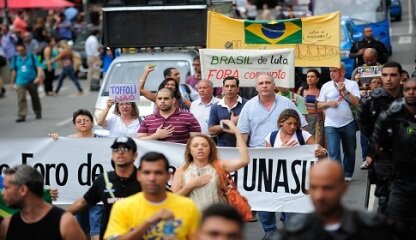Dilma Rousseff’s visit to the United States was hailed by both countries and by many international analysts as marking a new chapter in bilateral relations between the two largest democracies in the Western Hemisphere – strained since 2013, when Rousseff discovered she was being spied by US government and decided to cancel a scheduled trip to the country.
“Our focus is on the future,” said President Barack Obama, in an interview alongside Rousseff at the White House. “I believe this visit marks another step in a new and more ambitious chapter in the relationship between our countries.” The Brazilian president went in the same direction. “We relaunched the relationship with the United States in a major future and present possibilities level,” she said.
In the same week of the meeting, WikiLeaks revealed details about NSA spying on Brazil. Calls from 29 Brazilian government offices have been intercepted, including the Presidency, the Ministry of Finance, the Central Bank and the Ministry of Foreign Affairs.
This time, the Secretariat of Social Communication (Secom) of the Presidency issued a statement saying that President Dilma Rousseff trust in US President Barack Obama, and his commitment that there will be no espionage against Brazil and Brazilian companies. The minister of Secom, Edinho Silva, had said that the government considers the episode overcome and that the revealed wiretaps are from 2011. “The president just returned from a productive trip and several agreements were closed. The focus now is to maintain good relations with the US and future investments,” argued the minister.
In the midst of a political and economic crisis, a corruption scandal involving government allies and approval ratings below two digits, Rousseff sees the external front as a hope to generate good news.
Thus, the trip was dominated by trade issues. In New York, Rousseff sought to entice investors with concessions in infrastructure valued at US$ 64 billion and, in Silicon Valley she sought advice on innovation with entrepreneurs from the technology sector. The Americans promised to lift the ban on imports of Brazilian beef, ending a negotiation that has lasted nearly 15 years. It is also possible that, in 2016, the two countries sign an agreement to reduce non-tariff barriers and harmonization of customs procedures, which should end up facilitating the entry of Brazilian products in the United States, the first ranking country purchasing industrial products from Brazil.
With US$ 9.7 billion from January to May 2015, the United States is currently the second largest buyer of Brazilian products (counting no industrialized as well), behind China, which imported from Brazil US$ 13.7 billion this year. Brazilian exports to the US, however, fell about 8% over the same period of 2014, when it reached US$ 10.5 billion. In the first five months of this year the trade balance between the two countries was unfavourable to Brazil at US$ 2 billion. Last year, trade in goods and services between the two countries reached US$ 110 billion and the intention is to double this amount in ten years.
Brazil and the United States also pledged to increase the share of renewable sources in their energy mix. The goal is for this index, not including the generation of hydroelectric power, to reach over 20% by 2030. According to the latest data, from 2012, currently this share is 12.9% in the US and 7.8% in Brazil, not including hydropower.
With scepticism on both sides – those who expected a more effective response to Barack Obama regarding the spying allegations as those who consider the actions of Dilma Rousseff still quite shy – the success of the trip will depend on what happens going forward.
—



